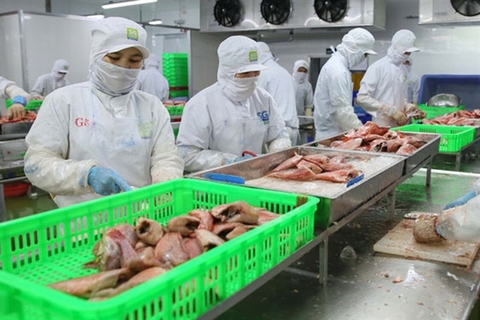
In the first half of August this year, shrimp export value to the EU reached $29.4 million. — Photo nld.com.vn
More than 7,200 EUR.1 certificates of origin (C/O) were issued in August for goods exports to the EU worth US$227 million since the EU-Vietnam Free Trade Agreement (EVFTA) took effect last month, according to the Ministry of Industry and Trade (MoIT).
The certified goods were mostly footwear, seafood, plastics, coffee, garments, handbags, suitcases, vegetables, and rattan products.
Major importers are Belgium, Germany, the Netherlands and France, who have seaports and serve as logistics hubs in the EU.
The representative of the MOIT’s Import-Export Department said Viet Nam has advantages in production and export of agricultural, forestry and aquatic products, while the EU has a large demand for these items that have accounted for 8.4 per cent of total annual import value. This shows great potential in export growth from Viet Nam to the EU.
For instance, the Trung An High-tech Agriculture Joint Stock Company exported the first batch of 3,000 tonnes of rice to Germany with zero tax rate. Of which, the price was $1,000 per tonne of ST20 rice and $600 per tonne of Jasmine rice, $200 higher than before.
In the first half of August this year, shrimp export value to the EU reached $29.4 million, a strong growth of 26 per cent compared to the same period in 2019. The export value for the whole of August was estimated to increase by 20 per cent year on year.
Truong Dinh Hoe, General Secretary of the Viet Nam Association of Seafood Exporters and Producers (VASEP), forecasted shrimp exports to the EU will continuously increase until year-end. The preferential tax for Vietnamese shrimp would be an important factor for EU importers to promote shrimp imports from this country.
To enter the EU market, the local businesses must have certification of origin and meet food safety requirements, Hoe said. In addition, they need to pay attention to the agreement’s commitments on increasing the environmental requirements related to fishing to avoid difficulties in seafood export, reported the Nguoi lao dong (Labourers) newspaper.
The fisheries industry also needs to quickly remove bottlenecks in the supply chain of materials and varieties for production and market development of businesses.
A better understanding of commitments in the EVFTA is one of the important factors for local businesses, said Luong Hoang Thai, director of the MoIT’s Multilateral Trade Policy Department.
He said businesses need to apply science and technology to improve their competitiveness and create supply chains with cooperatives and farmers.
Economic expert Le Dang Doanh said to expand market shares in the EU, Viet Nam must urgently remove the yellow card for seafood products to open more export opportunities to this market for local enterprises. Enterprises need to study market information and consumer demand in the EU.
According to the ministry, the trade pact, which came into force on August 1, would help Viet Nam diversify its export markets as well as export products. A wide range of Vietnamese goods have benefited from tariff reductions, such as farm produce, seafood, footwear, and electronic products.
Therefore, the MoIT will continue to support local companies, ensuring exporters know how to take full advantage of the EVFTA and have a thorough understanding of C/O. It will also work closely with EU partners to address difficulties while implementing the trade pact in a timely manner.
Besides that, the ministry is developing a trade promotion plan for the 2020-25 period to contribute to Viet Nam’s sustainable export development in the context of implementing the EVFTA and other free trade agreements. — VNS